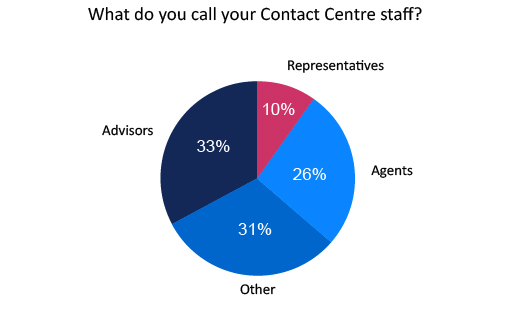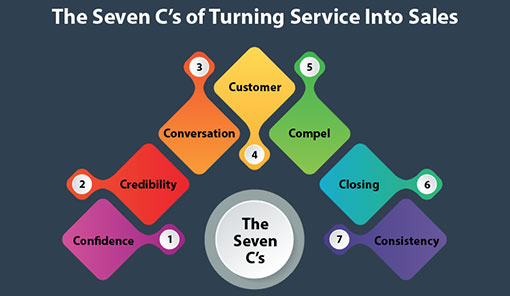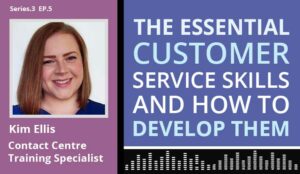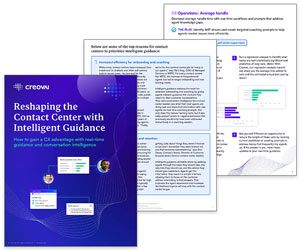Many contact centres are shifting their focus from service centres to service and sales.
While the trend towards sales through service makes good practical sense, some contact centre advisors may not see themselves as salespeople.
Unfortunately, if a contact centre is purely driven by service metrics, getting the team to switch their focus to selling can be a problem and could be met with resistance. After all, being a salesperson isn’t the job that they signed up for, right?
Here we take you through how you can make your customer service team more sales-orientated, while not disrupting the team dynamic or spirit.
Change the Advisor Job Title
There are a number of job titles given to frontline staff in the contact centre. These include representatives, specialists and even ninjas (yes, really!). However, the most popular option is ‘Customer Service Advisor’, as we found in our poll below.

This poll was taken from our article: What Should We Call Frontline Call Centre Staff?
While this all seems well and good, Carolyn Blunt, Marketing Director at Ember Real Results, takes issue with this job title if the contact centre is aiming to create a greater sales focus.
“If you are calling your frontline teams ‘Customer Service Advisors’, and perhaps they are taking orders in a retail or online shopping environment, it’s a mindset shift to say: ‘that’s not enough’ and to ‘think about what other products you might be able to offer’.”
Taking this point into consideration, it becomes clear that it is important to create job titles for the contact centre that reflect where it may want to take the role in the future.
Humans don’t like change. So, it’s much easier to recruit to something that you are building than to try and drag the team, two years from now, kicking and screaming in that direction.
Making this point, Carolyn asserts that: “Humans don’t like change. So, it’s much easier to recruit to something that you are building and to say, ‘this is what it’s going to look like’ than to try and drag the team, two years from now, kicking and screaming in that direction.”
Bearing this in mind, it could be worth changing the role title from “Customer Service Advisor” to “Contact Centre Advisor”, to better prepare the team for the transition.
Remember, by introducing a sales focus, a service-based contact centre is breaking the team’s current expectations of the role. And while it is understandable to think that this wouldn’t be a huge change, doing so can break the “psychological contract” that an advisor has with the organisation.
Think About Psychological Contracts
Breaking an advisor’s psychological contract can be a big problem for a contact centre, in terms of increasing attrition and absenteeism, as forcing the team out of their comfort zone is unlikely to be met with enthusiasm.
Carolyn Blunt explains how taking the team away from this comfort zone is unfavourable, by using the following analogy:
“Most of us have a favourite seat in our living room, and if anyone sits in that seat when you want to sit in it, it doesn’t feel right. You just want to go back to your comfort zone. This is because you spend a lot of time there. A contact centre environment is no different.

Carolyn Blunt
“People spend 40 hours a week sitting in that environment and if you get them to move away from their beloved seat by the window and sit somewhere else, you’re going to have a battle on your hands.
“There is a reason why it is hard to change human behaviour in a contact centre environment, and it is because of something called a psychological contract. This is something that is absolutely in all of us, you have a psychological contract with your employer and it was formed in the recruitment phase, through your induction.
“It is a set of expectations, which are very much unwritten, but are clear in your head.”
With this in mind, if someone was to sign up for the role of “Customer Service Advisor” and was then inducted into a training programme that was created to get them to cross-sell, up-sell and offer more out-o–stock alternatives, is it their job to do that? Why would they want to do that?
When we try to break the psychological contract, it can cause attrition, which highlights the importance of building a culture in which the team are more open in terms of job flexibility.
Carolyn continues: “When we try to break the psychological contract, it can cause attrition, which highlights the importance of building a culture in which the team are more open in terms of job flexibility.”
However, it is much more easily said than done to create a culture in which advisors have a more open mindset, but it’s not impossible.
To manage this culture change on the contact centre floor, remember these four key points:
- Consider the legacy of your organisation’s culture
- Acknowledge the good points, as well as the bad
- Manage the change transformation
- Develop effective communication
Find out how to build a better culture in our article: Create and Maintain a Positive Culture
Develop Key Sales Through Service Behaviours – Remember the Seven C’s
Once advisors are in the most flexible environment possible and are on board with the new sales focus, it is then important to emphasise the importance of seven key skills.
Helping the team to develop each of these skills enables each advisor to become confident in converting customer service queries into additional sales.
So, Leon Boland, Senior Learning & Development Consultant at Ember Services, advises educating advisors on the Seven C’s highlighted below.

1. Confidence
Are your people confident to have a conversation? Confidence comes from experience, and if advisors don’t have confidence, customers are going to sense that, particularly on the contact centre ‘stage’.
This is according to Leon, who says that: “It’s quite easy to tell if someone is quiet or nervous over the phone and often it comes across as not having belief in what they are trying to up-sell.”
Not giving advisors the correct coaching, so that they feel confident in selling to customers, strips the advisor of their credibility, the second C…
2. Credibility
Are people credible? Do they know their stuff? Or is the contact centre just throwing sheets in front of advisors and saying, ‘that’s what we expect you to try and sell’?
These are all questions that Leon suggests contact centres ask themselves, as well as the following:
- Are you giving them digital learning that they can access instantly to prepare for new tasks and services?
- Are you delivering effective and impactful team huddles?
- Does your leadership team have the capability to understand how people learn and how people are going to absorb the messages and implement them?
If you answer yes to all of the above, it is very much likely that the team are credible in their product/service knowledge and selling capability.
3. Conversation
Conversation is critical and that includes speaking but also listening, stresses Leon.
“One thing that people forget to do is listen, because, when you are having a conversation, distractions are everywhere, but these can also be a good thing.”
Once I had a job selling broadband and TV packages, so if I were to hear kids in the background, I would be all over that ‘kids package’, because I can relate to them.
“For example, once I had a job selling broadband and TV packages, so if I were to hear kids in the background, I would be all over that ‘kids package’, because I can relate to them.
“I had about 15 kids by the end of the one particular conversation, even though I don’t have any. I said that because it made the conversation personable, it made me relate to the customer.”
For more tips on improving advisor conversation, read our article: Top Tips for Building Rapport on the Telephone
4. Customer
As Leon says: “Providing a great customer experience enables the sales through service solution to work. Because if your organisation absolutely nails its service, at each touchpoint, the customer will buy.”
So, this customer focus should be shared by both the contact centre and each individual advisor.
For the organisation – Are you testing and tracking the customer journey? Are you measuring customer satisfaction (CSat) at each touchpoint to find out how service can be improved?
For each advisor – Do you know how to show empathy? Do you know how to best comfort, acknowledge and reassure customers on the phone? Are you confident in knowing when best to up-sell?
5. Compel
Think about everyday conversations, in any customer service environment, and the opportunities that pass us by to sell to customers. Sometimes, even customers can find it frustrating that advisors miss these opportunities.
As Leon says, “I’ve had it many a time where I have walked out of a shop and I’ve read on the poster outside that there was a three for two offer on the product that I have just bought two of, but nobody had told me. Maybe it was a product that I could easily stock up on, because I buy these things all of the time.”
A contact centre example would be a customer phoning up and not getting an offer that their friend received when phoning with the same query.
“Contact centre advisors often don’t seem to push offers and compel customers, even though that can be a deciding factor in the customer’s relationship with your organisation. So, it is critical that contact centres offer a complete solution to a customer during any interaction.”
6. Closing
This is something that most people get nervous about, and contact centres need to equip advisors with the training, skills and confidence to be able do this.
There are different techniques to close a call, and one that Leon particularly likes is assumptive closing, i.e. ‘would you like this option or this one?’, which he has found to work surprisingly well.
If the conversation seems natural and friendly, in that moment, the customer would be more likely to buy something from us.
“As a customer, having this simple option takes away effort and the need to think.”
“If the conversation seems natural and friendly, in that moment, the customer would be more likely to buy something from us.”
7. Consistency
This is something that is so tough for the contact centre team, because it’s all about keeping the frontline motivated, and how do you do that?

Leon Boland
As Leon says: “Remember advisors can speak to 40–50 people in a day. I don’t even get that in a normal week. When you get to senior level, you may be doing more emails and conference calls, but advisors are constantly talking to a churn of different people, who are asking the same things over and over again. So, a lot of work need to be placed on disrupting this repetitiveness.”
“Let’s work on lowering script adherence and maybe just giving advisors bullet points instead, to allow them to bring a bit of personality to the role. This is critical because it allows advisors to change the way that they handle each conversation.”
It is more than likely that low consistency in terms of job variety results in higher consistency in terms of sales from service.
A Final Point – Think Carefully About Giving Financial Incentives for Sales
Financial rewards can work well as an incentive, but in terms of the new generation that is coming into the contact centre – the millennials – it might not be the right one for them.
Carolyn Blunt says: “It is likely that millennials are more likely to be willing to take time off, get involved in community projects, see the business invest in something for the greater good – rather than just be motivated by something that goes into their pockets.”
“But investigating how to make selling more appealing is an important point to make, and this can be done through more creative incentives and motivational games.”
Investigating how to make selling more appealing is an important point to make, and this can be done through more creative incentives and motivational games.
While creative incentives may be more cost-effective, they also bypass some of the risks associated with financial rewards. Simon Foot, also of Ember Services, makes this point:

Simon Foot
“We worked with a retailer who offered incentives for complaints, just because they wanted to show their regulator that they were really serious about capturing those complaints.”
“What happened? Hundreds and hundreds of complaints were suddenly generated, of which half were completely unfounded.”
“So, thinking about those unintentional consequences is often an important thing to do. And I think we get a little bit lost when one part of the organisation says, ‘right, I want to drive this capability through incentivisation’ and then there are a whole heap of other things that happen’.”
Taking this into account, if a contact centre does decide to begin offering financial rewards, it is important that it ensures that a knock-on effect does not occur where an advisor neglects customer service essentials and prioritises the sale.
Therefore, perhaps incentives should be based on quality scores, of which a small percentage is based on sales through service.
For more incentive mistakes, read our article: Seven Examples of When Contact Centre Incentives Fail
Do you have any more tips for creating a sales focus in a customer service-based contact centre?
Please share your thoughts in an email to Call Centre Helper.
Author: Robyn Coppell
Published On: 21st Mar 2018 - Last modified: 14th Aug 2025
Read more about - Customer Service Strategy, Carolyn Blunt, Customer Service, Ember, Empowering Agents, Service Strategy, Telesales





















